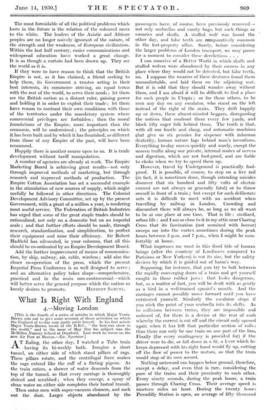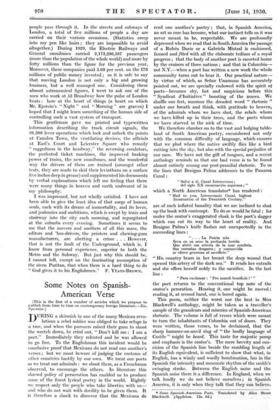What Is Right With England
4.—Moving London
[This is the fourth of a series of articles in which Major Yeats- Brown sets out to give some account of those activities on which the England of to-day may justly pride herself. In his first article Majcr Yeats-Brown wrote of the B.B.C., " the best-run show in the world," and in the issue of May 31st his subject was the McMillan Nursery School at Deptford. Last week ho wrote on the new Air Port at Heston.—En. Spectator.] AT Ealing, the other day, I watched a Tube train having its bi-weekly bath. Imagine a short tunnel, on either side of which stand pillars of rags. These pillars rotate, and the centrifugal force makes the rags extend like the ruff of a flirting pigeon. As the train enters, a shower of water descends from the top of the tunnel, so that every carriage is thoroughly sluiced and scrubbed ; when they emerge, a spray of clean water on either side completes their lustral transit.
Then enter,men with super-vacuum cleaners, and suck out the dust. Larger objects abandoned by the passengers have, of course, been previously removed— not only umbrellas and vanity bags, but such things as canaries and skulls. A stuffed wolf was found the other day, and false teeth are comparatively common in the lost-property office. Surely, before considering the larger problems of London transport, we may pause for a moment to consider these derelictions . . .
I can conceive of a Better World in which skulls and stuffed wolves were abandoned by their owners in any place where they would not be detected, but false teeth, no. I suppose the wearers of these dentures found them uncomfortable, and laid them on the adjoining seat. But it is odd that they should wander away without them, and I am afraid it will be difficult to find a place for such people in Utopia ; or for those others, to be seen any day on any escalator, who stand on the left instead, of the right of the stairs. They drift happily up or down, these absent-minded beggars, disregarding the notices that confront them every few yards, and .block fifty eager folk behind them. The truth is that, with all our hustle and clang, and automatic machines that give us six pennies for sixpence with inhuman dexterity, human nature lags behind man's inventions. Everything to-day moves quickly and surely, except the unseen traffic along our private, internal routes of nerves and digestion, which are not fool-proof, and are liable to choke when we try to speed them up.
However, travel by Underground is practically fool- proof. It is possible, of course, to step on a live rail (in fact, it is sometimes done, though intending suicides discover that six hundred and fifty volts of electric current are not always or generally fatal) or to throw oneself in front of a train ; but except for such deliberate acts it is difficult to meet with an accident when travelling by railway in London. Crowding and discomfort there will always be, as long as we all want to be at one place at one time. That is life : civilized, urban life : and I am so close to it in my attic near Charing Cross that its fascination (not unmixed with horror) sweeps me into the vortex sometimes during the peak hours between 5 p.m. and 7 p.m., when I might be com- fortably at home.
What impresses me most in this flood tide of human beings (after the courtesy of Londoners compared to Parisians or New Yorkers) is not its size, but the safety devices by which it is guided out of harm's way.
Supposing, for instance, that you try to bolt between the rapidly converging doors of a train and get yourself caught in those rubber jaws : that looks dangerous, but, as a matter of fact, you will be dealt with as gently as a bird in a well-trained spaniel's mouth. And the carriages cannot possibly move forward until you have extricated yourself. Similarly the escalator stops if you stick the point of your umbrella into its clefts. As to collisions between trains, they arc impossible and unheard of, for there is a device at the rear of each whereby the current is cut off and the circuit only opened again when it has left that particular section of rails : thus there can only be one train on one part of the line. Finally (for every contingency is provided for) if the driver were to die, or fall down in a fit, a lever which he keeps depressed with his right hand would fly up, cutting off the flow of power to the motors, so that the train would stop of its own accord.
Nothing untoward can happen below ground, therefore, except a delay, and even that is rare, considering the pace of the trains and their proximity to each other. Every ninety seconds, during the peak hours, a train passes through Charing Cross. Their average speed is nineteen miles an hour. During the twenty hour; Piccadilly Station is open, an average of fifty thousand people pass through it. In the streets and subways of London, a total of five millions of people a day are carried on their various occasions. (Statistics creep into my pen like hairs ; they are impossible to avoid altogether.) During 1929, the Electric Railways and General omnibuses carried 2,175,236,587 passengers (more than the population of the whole world) and more by forty millions than the figure for the previous year, Moreover, these companies paid 5.69 per cent, on the £73 millions of public money invested ; so it is safe to say that moving London is not only a big and growing business, but a well managed one. Considering these almost astronomical figures, I went to ask one of the men who work at 55 Broadway how the pulse of London beats : here' at the heart of things (a heart on which Mr. Epstein's " Night " and " Morning " are graven) I hoped that I might learn something of the human side of controlling such a vast system of transport.
This gentleman gave me printed and typewritten information describing the track circuit signals, the 91,888 lever operations which lock and unlock the points at Camden Town, the ventilating devices, the officials at Earl's Court and Leicester Square who remedy " raggedness in the headway," the reversing escalators, the perfected ticket machines, the improved braking power of trains, the new omnibuses, and the wonderful way the drivers of them are trained (amongst other tests, they are made to skid their leviathans on a surface five inches deep in grease) and supplemented his documents by verbal explanations which left me feeling that there were many things in heaven and earth, undreamt of in my philosophy.
I was impressed, but not wholly satisfied. I have not been able to give the least idea of that surge of human souls, each with its dream of immortality, and its loves, and jealousies and ambitions, which is swept by train and stairway into the city each morning, and regurgitated at the suburbs every evening. Sometimes it seems to me that the movers and soothers of all this mass, the editors and 'bus-drivers, the printers and chewing-gum manufacturers, are abetting a crime . . . However, that is not the fault of the Underground, which is, I know from personal experience, superior to both the Metro and the Subway. But just why this should be, I cannot tell, except on the fascinating assumption of the stern Puritan, that when there is a hard thing to do " God gives it to his Englishmen." F. YEATS-BROWN.



































 Previous page
Previous page